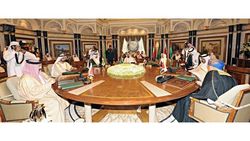Arab News | 12 May 2011
By SIRAJ WAHAB | ARAB NEWS
DAMMAM: The announcement about the possible inclusion of Jordan and Morocco in the Gulf Cooperation Council is meeting with equal measures of optimism and skepticism in Saudi Arabia.
Some analysts say the decision to include new members stems from political unrest in the Arab world. Some see it as a direct response to the continued Iranian initiatives to destabilize the region. Others wonder what Morocco has to do with the GCC, which up until now has been confined to six of the seven countries in the Arabian Peninsula.
The membership process for Yemen is under way, and in 2016 it is due to join the current members — Saudi Arabia, Bahrain, Kuwait, Oman, Qatar and the United Arab Emirates. If Yemen, Jordan and Morocco join it will be a nine-member bloc representing 100 million people across the Arab world.
“There should be a series of steps before these countries are allowed to join in. One should carefully think of the pros and cons. The European integration took years before it took place. They took 15 years before the formation of the European Union,” said Abdul Rahman Al-Zamil, head of the Riyadh-based Saudi Export Development Center and chairman of Zamil Group Holding Co. “From what I am reading in the newspapers, this is in response to the Iranian threat. Why is it that Jordan and Morocco did not seek GCC membership before? Why now? All this is happening because of the instability in the Arab world. Adding new members is not a bad idea, but there should be a process of accountability and consolidation.”
Al-Zamil is of the opinion the bloc should be focusing on the existing GCC for now: “The GGC should first ensure that all its achievements so far are consolidated before moving into new markets. That doesn’t mean we should not start the process but that process should be rigorous.”
He said history offered some cautionary parallels.
“We in the Arab world have seen the unity between Egypt and Syria ... it failed miserably and couldn’t pass the first test. The second failure was the creation of the North African market. It was again a failed idea,” Al-Zamil told Arab News. “It is, therefore, extremely important for the GCC Secretariat to evaluate the dividends of the current common Arab economic market ... especially the ties between the GCC and Jordan and Morocco to see whether these two countries are actually implementing and respecting the rules and the agreements that were agreed upon in recent years.”
Al-Zamil was extremely skeptical of Yemen’s entry into the GCC both in terms of current political strife and the economic consequences for current members.
“It would be a disaster if the GCC allows Yemen to become a member now. It is facing huge problems. What the GCC should do is to announce an economic package to develop its infrastructure and economy on the lines similar to that of Bahrain and Oman. Once its economy stabilizes only then it should be allowed in,” he said.
“Let me reiterate that there is already a common Arab market. Our goods move freely everywhere in the Arab world. There is no customs duty. I am OK with the military union, as well, but the problem would be with the open movement of labor. How would that happen? And what impact would it have on other economies? Those are the questions to be looked at.”
Others said that the time was right for the GCC to go ahead with its expansion plans.
“The more, the merrier — bigger the better,” said Khalid A. Al-Abdulkarim, CEO of Alkhobar-based Al-Abdulkarim Holding Co. “The world is now divided into economic blocs. Look at the European Union ... it is a huge, single entity, and it has got huge leverage because it is one group with a huge market and a common currency,” he said.
He said the GCC countries and both Jordan and Morocco share the same language, culture, heritage and the same religion.
“Integrating them with the GCC bloc makes eminent business sense. They are strategically located and will bring in huge value to the group.”
Al-Abdulkarim said the decision may have political overtones but ultimately it is economics that will decide the future course of action. “We all know how European nations suffered from political differences but they did come together on the larger economic interests and they succeeded. Gradually the political differences became secondary to the economic advantages. Integration of Jordan, Morocco and Yemen would be fantastic news for the whole region.”
John Sfakianakis, chief economist at one of Kingdom's leading banks, disagreed. “I think that there is very little interest at the moment for the six GCC countries to benefit from the inclusion of two countries, which are fairly small in size and far less wealthy than the GCC,” he told Arab News. “It could happen, but what the current GCC countries export is already imported by Jordan and Morocco. Far more, Jordan and Morocco export goods desired by GCC countries in terms of agriculture, labor and textiles."
According to him, geographically it makes no sense to expand because the GCC includes the Gulf countries only; otherwise the GCC would have to be renamed into the Middle East Union (MEU). “Before including new members they should first achieve greater economic union among the existing six rather than including more. I don't see a lot of economic benefits for the GCC especially as Jordan and Morocco have plenty of cheap labor, which will freely move around. What will happen to Saudization and Omanization and Bahrainization?”
Sfakianakis also expressed skepticism that Yemen was ready for full membership in the GCC. “It would certainly be challenging, as labor would be freely allowed to move around the GCC — just like in the EU — unless special labor prohibitions were taken. With Yemen moving closer to inclusion status in the GCC, time should be allowed to heal the economic wounds of a Yemeni economy that is in deep suffering. Just by including more members the GCC won't necessarily become stronger, it could in fact become weaker as an economic entity.”
Professor Mohamed Ramady of King Fahd University of Petroleum and Minerals feels it is not clear from the announcement whether the new members will be joining as full-fledged members or associate economic members with full membership status. "The EU model is relevant here as the newest members joined on a gradual basis to ease their entry to full status once certain domestic, economic, political, legal or social adjustments took place to avoid a burden on existing members," said Ramady.
He said the desire for membership of Jordan and Morocco is driven more by political interest. "Yemen's proximity to the GCC, its abundant labor force, especially semi-skilled, and potential large consumer market makes it a more natural fit for the GCC, and its strategic position can add a military dimension to avoid foreign interference into the GCC through a soft underbelly," he said.
Business journalist Abdul Hadi Al-Habtoor agrees with Al-Zamil that the decision has political overtones. "Everyone of us have been surprised by the announcement. We were hearing of Yemen's possible inclusion for a long time. But Jordan and Morocco? No, that came as a total surprise," he said.
However, Al-Habtoor feels that the GCC will have everything to gain from the two new entrants. "Jordan and Morocco are centers of tourism, and the free flow of movement will spur GCC nationals to visit these two countries in large number. That will bring in the tourism largess for these two countries," he pointed out. "In return, the GCC states can tap into the large swaths of fertile agricultural lands of Jordan and Morocco. GCC nations are looking for food security, and these two countries can provide just that."
Sfakianakis, the banker, has a word of caution for the decision-makers at the GCC Secretariat. "Just by including more members the GCC won't necessarily become stronger," he says. "It could in fact become weaker as an economic entity. Remember, Germany paid dearly for its unification with its Eastern half but that was Germany, the most powerful economy in Europe. The EU made a blunder by including Bulgaria and Romania too hastily. Therefore, the GCC should be cautious and measured."
Divergent views emerge on GCC expansion plan
-
 Arab News
Arab News
- 12 May 2011
Who's involved?
Whos Involved?
Carbon land deals
Dataset on land deals for carbon plantations
Languages
- Amharic
- Bahasa Indonesia
- Català
- Dansk
- Deutsch
- English
- Español
- français
- Italiano
- Kurdish
- Malagasy
- Nederlands
- Português
- Suomi
- Svenska
- Türkçe
- العربي
- 日本語
Special content
Archives
Latest posts
-

CAR offers land ownership using cryptocurrency
- IT Web
- 23 June 2025












